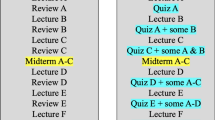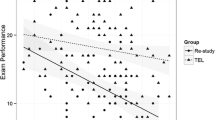Abstract
Testing has been shown to enhance retention of learned information beyond simple studying, a phenomena known as test-enhanced learning (TEL). Research has shown that TEL effects are greater for tests that require the production of responses [e.g., short-answer questions (SAQs)] relative to tests that require the recognition of correct answers [e.g., multiple-choice questions (MCQs)]. High stakes licensure examinations have recently differentiated MCQs that require the application of clinical knowledge (context-rich MCQs) from MCQs that rely on the recognition of “facts” (context-free MCQs). The present study investigated the influence of different types of educational activities (including studying, SAQs, context-rich MCQs and context-free MCQs) on later performance on a mock licensure examination. Fourth-year medical students (n = 224) from four Quebec universities completed four educational activities: one reading-based activity and three quiz-based activities (SAQs, context-rich MCQs, and context-free MCQs). We assessed the influence of the type of educational activity on students’ subsequent performance in a mock licensure examination, which consisted of two types of context-rich MCQs: (1) verbatim replications of previous items and (2) items that tested the same learning objective but were new. Mean accuracy scores on the mock licensure exam were higher when intervening educational activities contained either context-rich MCQs (Mean z-score = 0.40) or SAQs (M = 0.39) compared to context-free MCQs (M = −0.38) or study only items (M = −0.42; all p < 0.001). Higher mean scores were only present for verbatim items (p < 0.001). The benefit of testing was observed when intervening educational activities required either the generation of a response (SAQs) or the application of knowledge (context-rich MCQs); however, this effect was only observed for verbatim test items. These data provide evidence that context-rich MCQs and SAQs enhance learning through testing compared to context-free MCQs or studying alone. The extent to which these findings generalize beyond verbatim questions remains to be seen.



Similar content being viewed by others
References
Barnett, S. M., & Ceci, S. J. (2002). When and where do we apply what we learn? A taxonomy for far transfer. Psychological Bulletin, 128, 612–637.
Bjork, R. A., & Bjork, E. L. (1992). A new theory of disuse and an old theory of stimulus fluctuation. In A. Healy, S. Kosslyn, & R. Shiffrin (Eds.), From leaning processes to cognitive processes: Essays in honor of William K. Estes (pp. 35–67). Hillsdale, NJ: Erlbaum.
Boulet, J. (2008). Teaching to test or testing to teach? Medical Education, 42, 952–953.
Butler, A. C. (2010). Repeated testing produces superior transfer of learning relative to repeated studying. Journal of Experimental Psychology. Learning, Memory, and Cognition, 36, 1118–1133.
Butler, A. C., & Roediger, H. L. (2007). Testing improves long-term retention in a simulated classroom setting. European Journal of Cognitive Psychology, 19, 514–527.
Carpenter, S. K. (2012). Testing enhances the transfer of learning. Current Directions in Psychological Science, 21, 279–283.
Carpenter, S. K., & DeLosh, E. L. (2006). Impoverished cue sup-port enhances subsequent retention: Support for the elaborative retrieval explanation of the testing effect. Memory & Cognition, 34, 268–276.
Carrier, M., & Pashler, H. (1992). The influence of retrieval on retention. Memory & Cognition, 20, 633–642.
Chamberland, M., & St-Onge, C. (2013). Back to basics: Keeping students cognitively active between the classroom and the examination. Medical Education, 47, 641–643.
Chan, J. C. K. (2010). Long-term effects of testing on the recall of nontested materials. Memory, 18, 49–57.
Chan, J. C. K., McDermott, K. B., & Roediger, H. L. (2006). Retrieval-induced facilitation: Initially nontested material can benefit from prior testing of related material. Journal of Experimental Psychology: General, 135, 553–571.
Colliver, J. A. (2002). Educational theory and medical education practice: A cautionary note for medical school faculty. Academic Medicine, 77, 1217–1220.
Cook, D. A., Thompson, W. G., & Thomas, K. G. (2014). Test-enhanced web-based learning: Optimizing the number of questions (a randomized crossover trial). Academic Medicine, 89, 169–175.
Hinze, S. R., & Wiley, J. (2011). Testing the limits of testing effects using completion tests. Memory, 19, 290–304.
Janssen, S. A. K., VanderMeulen, S. P., Shostrom, V. K., & Lomneth, C. S. (2014). Enhancement of anatomical learning and developing clinical competence of first-year medical and allied health profession students. Anatomical Sciences Education, 7, 181–190.
Johnson, C. I., & Mayer, R. E. (2009). A testing effect with multimedia learning. Journal of Educational Psychology, 101, 621–629.
Kang, S. H. K., McDermott, K. B., & Roediger, H. L. (2007). Test format and corrective feedback modulate the effect of testing on long-term retention. European Journal of Cognitive Psychology, 19, 528–558.
Karpicke, J. D., & Roediger, H. L. (2007). Repeated retrieval during learning is the key to long-term retention. Journal of Memory and Language, 57, 151–162.
Kromann, C. B., Bohnstedt, C., Jensen, M. L., & Ringsted, C. (2010). The testing effect on skills learning might last 6 months. Advances in Health Sciences Education, 15, 395–401.
Kromann, C. B., Jensen, M. L., & Ringsted, C. (2009). The effect of testing on skills learning. Medical Education, 43, 21–27.
Kromann, C. B., Jensen, M. L., & Ringsted, C. (2011). Test-enhanced learning may be a gender-related phenomenon explained by changes in cortisol level. Medical Education, 45, 192–199.
Larsen, D. P., & Butler, A. C. (2013). Test-enhanced learning. In K. Walsh (Ed.), Oxford textbook of medical education (pp. 443–452). Oxford: Oxford University Press.
Larsen, D. P., Butler, A. C., & Roediger, H. L. (2008). Test-enhanced learning in medical education. Medical Education, 42, 959–966.
Larsen, D. P., Butler, A. C., & Roediger, H. L. (2009). Repeated testing improves long-term retention relative to repeated study: A randomized controlled trial. Medical Education, 43, 1174–1181.
Larsen, D. P., Butler, A. C., Lawson, A. L., & Roediger, H. L. (2013a). The importance of seeing the patient: Test-enhanced learning with standardized patients and written tests improve clinical application of knowledge. Advances in Health Science Education, 18, 409–425.
Larsen, D. P., Butler, A. C., & Roediger, H. L. (2013b). Comparative effects of test-enhanced learning and self-explanation on long-term retention. Medical Education, 47, 674–682.
Marsh, E. J., Agarwal, P. K., & Roediger, H. L., I. I. I. (2009). Memorial consequences of answering SAT II questions. Journal of Experi-mental Psychology: Applied, 15, 1–11.
McDaniel, M. A., Anderson, J. L., Derbish, M. H., & Morrisette, N. (2007a). Testing the testing effect in the classroom. European Journal of Cognitive Psychology, 19, 494–513.
McDaniel, M. A., Roediger, H. L., & McDermott, K. B. (2007b). Generalizing test-enhanced learning from the laboratory to the classroom. Psychonomic Bulletin & Review, 14, 200–206.
Medical Council of Canada. (2010). Guidelines for the development of multiple-choice questions. Ottawa: Medical Council of Canada.
Morris, C. D., Bransford, J. D., & Franks, J. J. (1977). Levels of processing versus transfer appropriate processing. Journal of Verbal Learning and Verbal Behavior, 16, 519–533.
National Board of Medical Examiners. (2002). Constructing written test questions for the basic and clinical sciences. Philadelphia, PA: National Board of Medical Examiners.
Roediger, H. L., & Karpicke, J. D. (2006). The power of testing memory: Basic research and implications for educational practice. Perspectives on Psychological Science, 1, 181–210.
Rohrer, D., Taylor, K., & Sholar, B. (2010). Tests enhance the transfer of learning. Journal of Experimental Psychology. Learning, Memory, and Cognition, 36, 233–239.
Schmidmaier, R., Ebersbach, R., Schiller, M., Hege, I., Holzer, M., & Fischer, M. P. (2011). Using electronic flashcards to promote learning in medical students: Retesting vs. restudying. Medical Education, 45, 1101–1110.
Schuwirth, L. W. T., Verheggen, M. M., van der Vleuten, C. P. M., Boshuizen, H. P. A., & Dinant, G. J. (2001). Do short cases elicit different thinking processes than factual knowledge questions do? Medical Education, 35, 348–356.
Wheeler, M. A., Ewers, M., & Buonanno, J. (2003). Different rates of forgetting following study versus test trials. Memory, 11, 571–580.
Wood, T. (2009). Assessment not only drives learning, it may also help learning. Medical Education, 43, 5–6.
Acknowledgments
This research was supported by the Medical Council of Canada Research and Development Fund #MCC1/1112. The authors would like to thank Ms. Linda Bergeron, MSc, and Ms. Katharine Fisher for their help and support with the realization of the study.
Author information
Authors and Affiliations
Corresponding author
Rights and permissions
About this article
Cite this article
McConnell, M.M., St-Onge, C. & Young, M.E. The benefits of testing for learning on later performance. Adv in Health Sci Educ 20, 305–320 (2015). https://doi.org/10.1007/s10459-014-9529-1
Received:
Accepted:
Published:
Issue Date:
DOI: https://doi.org/10.1007/s10459-014-9529-1




